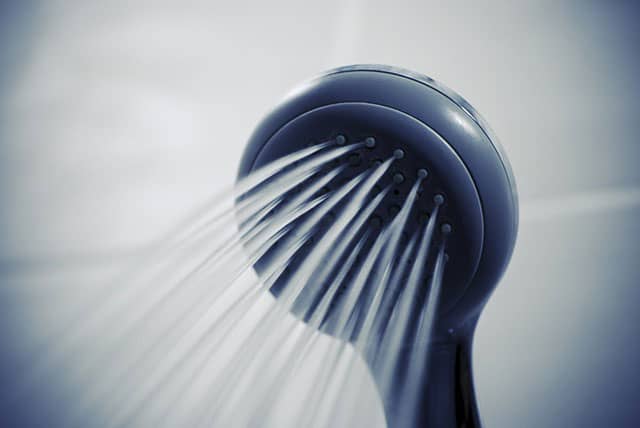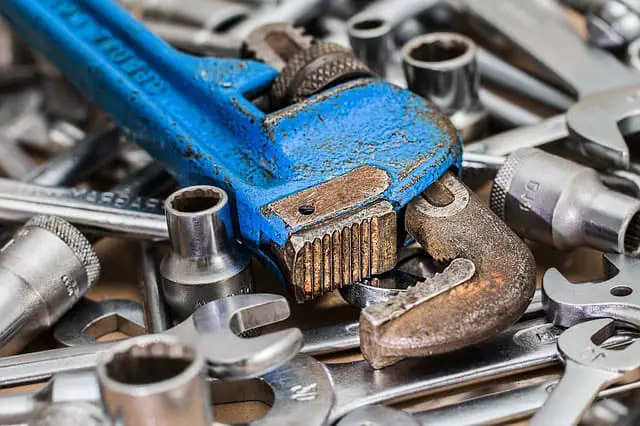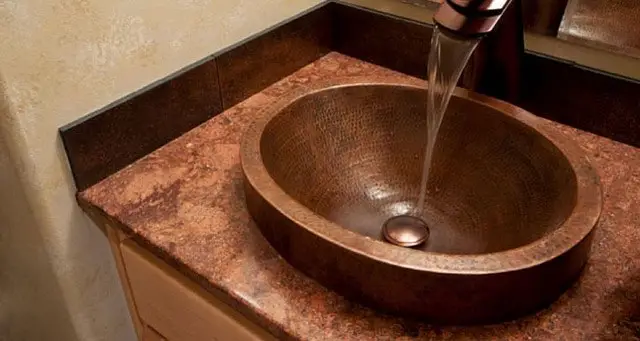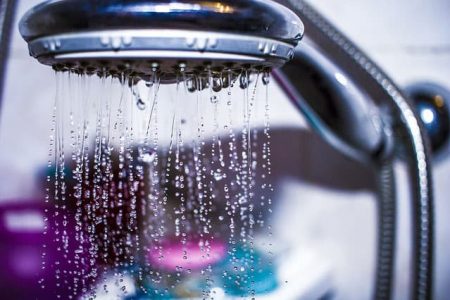Before I get into this guide on the benefits of tankless water heater pros and cons, let me start by saying one thing.
It is important to read the entire article as tankless water heaters may not be the right choice for every situation.
I’ve written this guide to give you all the information I can to make sure you make an informed decision to get exactly the right solution for you.
Don’t be put off by that warning!
On demand hot water heaters are an efficient way to get endless hot water and I highly recommend them to most people.
With that in mind, let’s dive in and see what the fuss is all about with regards to inline water heaters!
Pros and Cons of Tankless Water Heaters
Advantages
- Endless supply of hot water
- Energy savings of up to 30%
- Takes up less space
- Long lifespan (up to 20 years)
- Long warranties available
- Less prone to leaking
Disadvantages
- High initial cost
- High installation cost
- Low output in cold climates
- Occasional maintenance required
Are Tankless Water Heaters Worth It?
How important is it to you that you never run out of hot water?
The answer to that question will determine if ultimately it is worth it to buy a tankless water heater.
I am sure that if you are the last person to take a shower in your house every day that the answer is “very important”!
You seriously never need to worry about running out of hot water again no matter how many people took a shower before you. This is especially great if you have guests over.
If you want to fill up a jacuzzi and have it hot and ready to go then you really need a tankless hot water heater.
But, having endless how water is not always the only benefit and reason for wanting a tankless hot water heater.
Do tankless water heaters save money?
Operating costs of a tankless water heater are about 25 to 30% less than your typical tank water heater.
A traditional tank system runs all day and night. It’s nice having a tank full of hot water ready to go, but it costs money to do that.
Read More!
A common misconception is that tankless water heaters give you instant hot water. That isn’t the case unless you buy the right kind. Read this article to learn more about how to get instant hot water with a tankless heater.
Tankless only consume when you turn on the hot water, so they are naturally more cost effective than tanks.
So, let’s take a closer look at the two types of systems, tanks and tankless.

Cost of Tankless Water Heater vs Traditional Tank System
As I just mentioned, the cost of operating a tankless heater can save quite a bit of money. Typically in the hundreds of dollars per year in lower hot water bills.
The one big caveat is that the initial cost of a tankless is much higher than a tank.
That is a big generality though as it also depends on what your needs are.
For example, let’s say you live in a warm area of the country with groundwater temperatures in the 60’s or 70’s Fahrenheit. And you only have a two-person household living in an apartment. Then obviously your water demand is low.
In this case you could spend less than a couple of hundred for a point of use tankless water heater.
Check out this Ecosmart ECO 11 that has a 2.0 gallon per minute water flow. Now take a look at this 12 gallon American Standard tank water heater to give you the same type of performance for a two person home costs a little more than the tankless Ecosmart.
On the opposite side of the spectrum is the Rinnai gas tankless water heater that can supply 9.4 gallons per minute. This would be more than enough for a family of 5 with teenagers. That means lots of laundry being done at the same time as multiple showers. If you clicked over to Amazon, you see that it is fairly expensive.
For an equivalent water demand from a tank system, take a look at the Rheem 40 gallon tank water heater for about $700 less.
As you can see, depending on your needs, your costs will be higher, but the savings should see the tankless water heater pay for itself over a few years.
I put together the ultimate guide on tankless gas water heaters to help you find the best one for your needs. Click here to see the article.
Tankless Water Heater Size
You don’t have to be living in a tiny house or small apartment to appreciate the space savings you get from having an on demand water heater.
Considering how big a tank system is, you remove that and you now have a lot more space to put stuff.
An inline water heater can be used in a closet or under a sink. As long as it is vented if it is a natural gas or propane system. An electric tankless water heater doesn’t need venting, so that also gives you a lot of leeway as to where to put it.
They are usually mounted on a wall so the floor is freed up.
Life Expectancy of Tankless Water Heaters
This is another area where a tankless water heater is worth it.
A typical tank water heater lasts about 7 years. Maybe 10 if you get very lucky.
On the other hand, a tankless water heater lasts about 15 and in some cases 20 years. Yes, the upfront costs are higher, but if you are replacing a tankless water heater less often then this adds up to some significant savings. Especially when you factor in lower operating costs.
Warranties for the heat exchanger for a tankless water heater are generally over 12 years and for some they are closer to 15. This says a lot about how confident the manufacturer is about the tankless water heater lifespan.

Tankless Water Heater Maintenance
One thing that is generally very nice about tank water heaters as opposed to the tankless is how little thought you put into it. There is really no maintenance to speak of.
Tankless water heaters do need routine maintenance. This is especially true if you draw well water or live in an area with hard water.
If you have hard water then you need to flush your tankless water heater once per year to keep scaling from ruining the heat exchanger. This is very easy to do, however and only takes about an hour. If you live in an area where scaling is an issue then look for tankless water heaters with isolation valves. Having those makes it is as simple as plugging in a hose to flush it with vinegar.
There is a flow aide vs vinegar debate out there. I think there is no doubt flow aide is better, but vinegar works OK too.
The best way to avoid having to do that maintenance at all is to install a water softener filter. Take a look at this whole house water softener to get an idea of how it can make your life much easier. They deserve their own article, so one day I will write a guide about them as I think they are worth it even if you don’t have a tankless water heater.
Aside from that, there is really no other maintenance to deal with.
And you may not think about your tank water heater much. But if you have ever come home to find your basement ruined from a leaky water heater, then I can only imagine what you are thinking about it at that moment!
Other Disadvantages of a Tankless Water Heater
There are a few things that should be known that may be deal breakers when it comes to the pros and cons of tankless water heaters.
To some these might be small issues, but to others they might be a barrier to ever owning one. It’s up to you to evaluate and weigh the advantages and disadvantages. After all, they are not for everybody.
Cold Water Sandwich
This is a funny way to say that sometimes you get a burst of cold water if you have back to back uses.
In other words, if you are using hot water, shut off the fixture, and then turn it back on, the water will flow hot for a few seconds, then cold and back to hot.
This happens because the water is literally heated on demand. So, when you shut it off, the heat exchanger turns off and the water that is left in the pipes is hot. When you turn it back on, the water starts to flow again, and the hot water left in the pipes comes out first. But that is followed by cold water that takes a few seconds to heat back up.
You may or may not mind if that happens, it all depends on your comfort level.
It is avoidable, however.
For instance, you can add a hot water circulating pump to make sure that water is always available as soon as you turn on the fixture. Unless you use one on a timer like the one I linked to so it only heats when you are home, then it can negate some of the energy savings you get from using a tankless water heater.
There are also tankless water heaters with an internal water circulator, too.

Low Flow in Cold Climates
If you live in a cold area like New England or Canada then your maximum gallons per minute of hot water will be less than the ideal that is advertised for the tankless.
If you have high water demand in addition, then that is a double whammy. That isn’t to say that you can’t use one in a cold climate, you just have to be very careful about which one you choose. If you want to understand what to look for in a tankless water heater in a cold climate then click that link to read the full article with 8 helpful tips.
You definitely will need a high GPM natural gas tankless water heater if that is the case as they are the only type that can handle the demand efficiently.
If you’ve already decided that a gas tankless is for you then you really need to read my comprehensive guide on the best tankless gas water heaters.
If your water demands are very high and you’re afraid a tankless water heater can’t handle it, you can always buy two that have cascading capabilities and never have to worry about getting the right amount of hot water.
Not Retrofit Friendly
If you live in an old house with narrow gas and water lines, and an old gas meter, then you may have a less choice of tankless water heaters.
Though there are some that can be used on ½ gas and water lines, which are typical in older homes, some will need ¾ inch lines. And if you opt for gas, you’ll need an upgrade in the gas meter if yours is old.
It may not be cost effective if you live in an old house and have to make a lot of changes.
In a new house, or if you are building from scratch then a tankless water heater makes a lot of sense.
Just make sure you are up to date with your local tankless water heater clearance requirements.
Needs Backup when there is a Blackout
Not that you can’t use a tankless water heater when there is a power outage, but it will need some help.
There are no tankless water heaters that work with a live pilot light anymore. Even the gas fueled ones need an electrical source to power up and for the internal computer to work.
If you have an electric one, then obviously during a blackout it isn’t going to work without electricity.
You’ll need either a battery backup or a power generator to be able to use your tankless during a power outage. That in itself is not a big deal but it is another consideration when you are in the market for a new water heater.
To get an idea about using a tankless water heater without electricity then check out the full article I wrote about it with all the details.
Should I Get a Tankless Water Heater?
If you have read this far then you are still on the fence and this question is probably on your lips.
To properly answer if tankless water heaters are better than tanks, then let’s recap.
If you live in a new house, have low to medium hot water demand, love the idea of endless hot water and don’t mind doing a yearly flush of the heat exchanger, then yes, a tankless hot water heater is worth it.
If your house is old, you have a limited budget for the initial costs or you live in a very cold area with high hot water demand, then I would say you have to weigh your options carefully.
I wouldn’t say that an on demand water heater isn’t worth it, but I wouldn’t say that you should definitely go for it either. They are not for everybody and every situation.
I would definitely be wary of a plumber or friend that tries to scare you off of a tankless water heater without knowing your situation first, however.

Nick Lopresti is the founder of YourH2Home and a home improvement expert. He has years of experience writing about various home improvement topics, mostly as it pertains to water systems.
